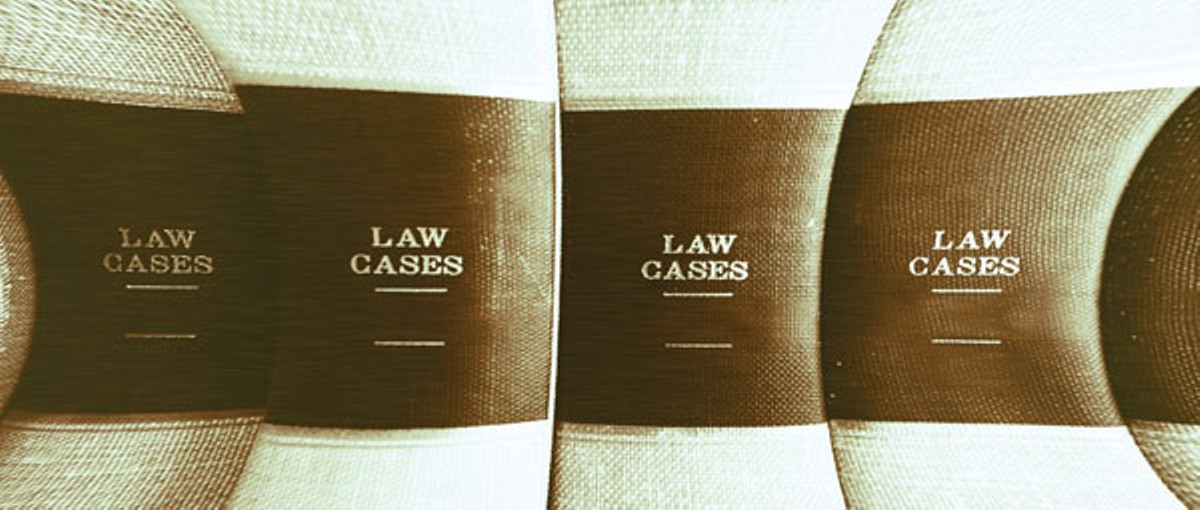Making Law School Relevant Again
Even if enrollment isn't declining at law schools, they certainly are changing. While law schools traditionally placed students in large lecture hall classes until the third year, today's law students receive more individual attention and are involved in clinics, externships and practical programs from the get-go.
"From day one, we think about when students get practical experience," says CWRU law school co-dean Jessica Berg, citing the university's capstone program where students spend 1-2 semesters practicing law. "We've pushed hard on increasing the number of credits for skills classes."
Jocelyn Benson, dean of Wayne State law school, says her school prepares students for careers in business, government and the nonprofit sector as well as law. "We're not just having law firms come to our campus anymore," she says. "Last year was the first year in a number of years that students had multiple job offers."
One growing area is "JD-advantaged" fields where a law degree provides a leg up but is not a requirement. University of Akron has increased the number of clinics it offers while adding specialties like corporate compliance. Northern Kentucky offers courses in corporate risk management and multiple joint degree programs. Indiana has a niche in intellectual property and is part of the United States Patent and Trademark Office's Law School Clinic Certification Pilot Program.
One of the most innovative programs in the region is at Cleveland-Marshall. The law school's solo-practice incubator program offers affordable office space, conference rooms and a reception area for new grads. It also offers reduced-cost health and liability insurance. The incubator is the first of its kind in Ohio.
Marshall interim dean Lee Fisher says he believes the market for legal services in Northeast Ohio is coming back. "I don't believe you can cut your way to survival," he says. "The only way to be a sustainable organization is to invest in the organization and raise revenue. I'm cautiously optimistic, particularly about the Cleveland and Northeast Ohio market."
The percentage of law graduates finding full-time jobs is also trending up at many schools. Berg says CWRU posted a 90 percent employment rate for law graduates in the past two years after they'd been out of school for 10 months, while University of Akron law school assistant dean Barbara Weinzierl says 93.5 percent of the school's graduates found employment within nine months. Of course, not all of these graduates are finding work in their chosen fields. One law student, Anna Alaburda, even sued her university, Thomas Jefferson School of Law, for using misleading statistics to lure students to enroll. Eight years out of law school, Alaburda has yet to find a full-time job as a lawyer.
"These types of numbers often are concealing the fact that the jobs being attained by grads are not the jobs they went to law school to get," says Lat. "The gold standard is a full time long term job requiring a law degree. You have stories of law grads working at Starbucks or a restaurant, and there are a lot of people like that out there." Which is how school's get to champion numbers like 90 percent employment while nationwide data shows only about half of that employment coming in the legal world.
Stephen Veltri, dean of Ohio Northern's law school, says despite declines in enrollment and credentials his school is not going anywhere. "Our students come from county seat towns in Michigan, Ohio and Pennsylvania, and they return to those towns," he says. "There are still crimes to be prosecuted, crimes to be defended, wills to be written. We've been at this for over 130 years."
Some deans take it one step further and argue that law degrees are increasing in value. "I think JDs will become the all-purpose degree for executive employment," says Northern Kentucky's Standen. "The MBA was created to be the all-purpose graduate degree for executive level employment, but the JD is coming alongside the MBA and perhaps might supplant it."
Lat says this kind of thinking is what got law schools in trouble in the first place. "I'm a little skeptical of the argument that people should go to law school even if they don't end up practicing as lawyers," he says. "The issue is it's three years and $200,000 and you're giving up the income you'd be making during that time. The cost is too high these days for it to be a finishing school for liberal arts grads."
The New Partner Track
Although law school deans paint an increasingly rosy picture of the legal job market, recent grads say they've had to adjust their expectations in order to find full-time employment. Most of them did not have jobs when they graduated and were still sending out applications while studying for the bar.
Catherine Donnelly was one of the "lucky" ones. First in her class at Cleveland-Marshall, she graduated in 2010 with an associate-level position in the public finance practice at Squire Sanders (now Squire Patton Boggs), one of the top law firms in Cleveland. Nine months later, however, she was laid off in one of the worst job markets in 80 years.
Donnelly ultimately landed on her feet, working at a labor law firm for four years before accepting a position at Moore Yourkvitch and Dibo, where Katie Weber also found work. She's very happy with the move. Her billable hour target is two-thirds of what it was at Squire Sanders, plus she can dedicate more time for pro bono work and take vacation.
"The legal services market is broken," she says. "The billable hour model does not work for lawyers and it doesn't work for clients. It creates unattainable expectations where the only way you can increase your bottom line is to increase the hours of employees or by raising rates, so you end up overworking people."
Many recent grads have had to make do with part-time work. In his article "The Oversaturated Job Market for Lawyers Continues, and On-the-Side Legal Work Grows," Joshua Davis writes: "Hiring has mostly been stagnant coming out of the recession ... take away full-time, salaried positions and the real growth in the lawyer job market has come from those working on the side in part-time arrangements."
One encouraging aspect of this trend is the rise in entrepreneurial activity. Like most of his classmates at Marshall, Moore Yourkvitch and Dibo founder David Moore didn't find a job right away after graduating in 2010. Instead, he used his nonprofit community development clinic experience to start own practice out of the school's incubator program.
"The economy was starting to rebound, and there was a demand for services but no way to pay for them," he says. "There was an opportunity for us to come in and fill the gap, and that meant really doing a lot of free and low-cost work. We'd essentially do the work for what they could pay us. At the big firms, alternative fee arrangements were still just a theory. They were laying people off."
Today, Moore has seven attorneys working for him, including several Marshall students. "It's not just an alternate fee arrangement but an alternate business model," he says. "We just listened and tried to figure out what the clients wanted."
Community developer Anthony Trzaska graduated from the University of Dayton law school in 2009 and is now working part-time as a "craft counselor" helping Cleveland Bagel, Cleveland Flea and other startups negotiate leases and other business documents. Eventually, he hopes to scale up his development business on Fleet Avenue, where his family also owns a funeral home.
Sam O'Leary graduated from Marshall in 2013 and bounced around for several years before finally landing a full-time position at Matty, Henrikson and Greve. He also serves as president of Lakewood City Council. He says going to law school is still a good value proposition, but you have to know what you're getting into. "I definitely feel like my legal education helped afford me the opportunity to get elected to city council," he says.
Marshall class of '16 grad Brooke Hamilton recently started an associate-level position at Gallagher and Sharp, one of the few people in her class to land a job at a big firm. "I've noticed that even if you don't go to one of the top 10 or top 15 firms in the city, the other midsize firms are still looking for people who have had some kind of work or clerking experience during law school," she says.
Donnelly says it's a myth that there are too many lawyers. Instead, she argues, the cost of legal services needs to come down across the board so that more people can afford them.
Her advice to new grads? "Go to law school because you want to help people," she says. "Keep your debt low. If you aim for the market above legal aid eligibility but below the $250 per hour mark, you probably will be able to make a living."














